Perseverance Trumps Positive Attitude
 We hear so much about how important it is to have a positive attitude. I think it is helpful to remind ourselves of what we’re grateful for because it keeps us from dwelling on what’s wrong, generally makes us feel more content with our lives, and because Oprah does it every day. Seriously! I recently went to her “Live The Life You Want” event and she credits her daily gratitude practice as part of her success.
We hear so much about how important it is to have a positive attitude. I think it is helpful to remind ourselves of what we’re grateful for because it keeps us from dwelling on what’s wrong, generally makes us feel more content with our lives, and because Oprah does it every day. Seriously! I recently went to her “Live The Life You Want” event and she credits her daily gratitude practice as part of her success.
I believe that choosing to focus on thoughts that are useful versus ones that drag us down makes sense. In my own recent experience with losing my beloved cat, consciously choosing to think that I made the best decisions possible at the end of his life has helped me cope.
I also believe there is merit to the law of attraction. Sometimes I seem to manifest whatever I’m focused on, for good or bad. I try to keep it positive so that I’ll manifest great things like my beautiful Dodge Challenger!
However, I don’t think that a positive attitude ensures we will only attract beneficial things into our lives, or that we can force our minds into thinking we’re happy when really we’re not. That would be arrogant, wouldn’t it, to think we controlled everything that happened to us!
During those times when circumstances are tough – when we’re facing a big problem, struggling with relationships or health or whatever the situation is – perseverance trumps a positive attitude. Thinking brighter thoughts might help. But perseverance is what gets us out of bed to eat and shower and get to work when we don’t feel like it. Perseverance pushes us to meet our obligations. Perseverance is what keeps us going one day after the next until we’ve made it through that tough time.
Two Tips For When You Feel Stuck at Your Job
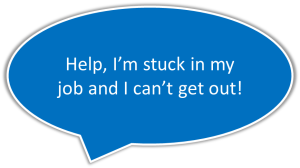 When you feel stuck in a job, you can get tunnel vision that focuses on what isn’t working.
When you feel stuck in a job, you can get tunnel vision that focuses on what isn’t working.
When you feel trapped because your salary pays the bills and provides health insurance, and gives you the means to support people who depend on you, it can seem like there aren’t very many good options. You may reject ideas about how to improve the situation or not have any ideas in the first place.
When you’re working in a job that isn’t right for you, it is draining. It is typical to feel overwhelmed and exhausted. On top of that, if you’ve been in an environment where you’ve been frequently criticized and your contributions haven’t been valued, it is common to lose confidence in your abilities.
I’ve had people tell me that they were so discouraged at work that they actually preferred being at home sick with the flu to going to the office!
This isn’t a good emotional state to begin creating a better job or work environment! But the truth is that there are many possible ways to improve work situations. It is just harder to access those possibilities when your perspective is narrowed by fear and discouragement.
One way to remind yourself that you do have options is to make a list of all the ways that your work situation can improve. This is a brainstorming-style list designed to open your mind, so including things that don’t seem realistic is actually a good idea. Things like, “My boss gets fired and a great new manager takes over the department,” or “A friend at another company recruits me to join his staff.” Or even, “I quit my job and go back to school to become a naturopathic doctor.”
If you are more visual and prefer not to write lists, mind-mapping is a great exercise. Take a blank piece of paper and jot down a single word or short phrase that represents what you’re ideal job situation would be. Then draw lines to connect the words that have common themes, and soon you’ll see patterns emerge.
Lists and mind-mapping are great ways to broaden your perspective when you feel stuck. These exercises tap into the part of your brain that has unique ideas and flashes of insight. In the short-term, taking these actions can boost your attitude by reminding you that there are many possibilities to improve your job situation. Then, with a more open mind, you might decide to pursue one of your ideas or discover a new opportunity that you might not have seen before.
Clearing Your Mailbox Reveals Where You’re Stuck
Yesterday was one of those hectic days when I juggled meetings, appointments and phone calls while my most important task didn’t get addressed until evening. I owed a new client a document that I was excited to work on. I could have approached the project many different ways, and all day long it was in the back of my mind.
Yet when I finally finished my meetings and had time to focus on the document, I did something else first: I cleaned out my mailbox.
I didn’t just deploy the Clean Up feature – I spent an hour overhauling Outlook. I already had a good folder system in place, but was bogged down by hundreds of old mails. By the time I finished, I’d deleted over 600 mails, archived folders that I didn’t want to see anymore, and realized that cleaning out a mailbox can reveal a lot.
Emails that you want to keep but haven’t filed reveal the topics that don’t fit neatly into the rest of your life. Email you haven’t responded to shows what you’re avoiding.
Are you ever going to reread those old articles or click again on the links to interesting websites? If not, it is time to let them go. But if those emails are full of tips that you can use, or ideas for your business then it is time to make a new folder for “Tips” or “Business Ideas”.
Cleaning out my mailbox showed me where I was stuck. When I was finished I felt lighter and energized, like I had freed up wasted space in my mind. I believe visual clutter leads to mental clutter whether the clutter is physical or virtual bits of data clogging up your PC.
When I finally started working on my client’s document, I quickly decided how to approach it and the project flowed smoothly. This afternoon the client told me I’d exceeded his expectations. That’s one of the best compliments I can hope for as a consultant.
I’m going to remember this the next time I want to have a clear, focused mind to start a new project. The first step will be to create space for it.
Might as well deal with your stuff now
If you use work to avoid what else in your life isn’t working and then you quit, or get laid off, or take a new job that doesn’t demand twelve hour work days, all of a sudden you’re going to be confronted with that stuff.
If you are so busy and distracted with work and your other obligations that you don’t notice all that stuff that you’ve been avoiding, it will be front and center in your life as soon as you have more time.
Think of all the people around you who complain about being too busy. Maybe you are one of them. If you weren’t too busy, then what would you complain about?
Your stuff will eventually catch up to you. When you start having more time, you have more time to think about damaged relationships, health concerns, financial chaos, or dreams that you put aside. Then what?
It can feel like doom and gloom, but it is actually an opportunity to get more of what you want in life. A little effort over a sustained period of time is how any great achievement is earned. Relationships can be repaired, greater health can be achieved, finance goals can be set, and dreams can evolve.
Might as well start now.
Still Using Your Company Email Address for Personal Business?
![]() Last week Microsoft announced another 3,000 layoffs. The news inspired me to check out the Mini-Microsoft blog that used to be a great gut-check of the view inside the company. It is largely inactive now, but as I scrolled past comments about the layoffs back in July, one of them caught my attention.
Last week Microsoft announced another 3,000 layoffs. The news inspired me to check out the Mini-Microsoft blog that used to be a great gut-check of the view inside the company. It is largely inactive now, but as I scrolled past comments about the layoffs back in July, one of them caught my attention.
The anonymous commenter had a great perspective. He acknowledged that while being laid off hurt, he was going to view it as an opportunity to discover what else he wanted to do. He closed by saying “I think it also may be healthy for me to not have my identity associated with my MS email address.”
Yes.
If you use your employer’s email address for your personal use, every time you hit “send”, you’re associating your personal identity with your place of employment. You’re signaling that you, as a person, are tied to your company even for personal matters.
If your identity is tied up with your employer, your job title, or the type of work you produce, it is smart to start building up your sense of yourself that is separate from work. This is a good thing to do anyway, but it is especially important if you’re about to leave a job. If you’re not prepared, you could slip into an identity crisis.
If you are using your work email address for personal business, make the change. Retrain your friends and family to use a personal address.
You are more than who you’re employed by.
If You Want to Quit Your Job in 2015, Check These Items Off Your List by December 31st
If you’re planning to quit your job in 2015, there are multiple things you can do before the end of the year to be better prepared.
Use your healthcare benefits. This is especially important if you’ve met your deductible for 2014, or are getting close. If you move to a new employer, your healthcare benefits may have higher deductibles or lower co-pays, or exclude the practitioners that you currently see.
Don’t forget the optometrist! Even if you have never worn glasses or contacts before, if your benefits include an eye exam, it is worth looking into (ha!). Or, if you have been wearing the same lenses for a long time, your vision might have changed. Many eye care benefits allow for one set of prescription glasses or contacts each calendar year. If you get new glasses now, you could also get prescription sunglasses or contacts in January.
My vision constantly gets better or worse. When I switched to private insurance, I no longer had optometrist benefits. Fortunately when I had benefits in the past, I got new glasses each year as my prescription improved or worsened, so now I can rotate through them as my sight changes.
Get your charitable donations matched. If your company has a charitable gift-matching program, take advantage of it by making your donations now.
If you can afford it, max out your employer-sponsored retirement saving plan. Got a 401(k), 403(b), 503(b), or another annualized retirement saving plan that your company matches? Most plans start over on January 1st. If you aren’t able to contribute the maximum limit, can you contribute enough to receive your employer’s highest matching amount? This is part of your earned compensation. Don’t leave it behind when you go.
If you’re trying to save money, consider taking less vacation time this holiday season so that you can cash it out when you quit. If you work for a company that is slow during the holidays, this can be a great time to be on the job anyway. It will be quieter and calmer, and you can work on the projects that are most important for you to accomplish before you leave. You can also use the extra privacy to print paystubs, retirement plan or stock details, and your past performance reviews.
Enjoy your holiday bonuses. If your employer gives cash bonuses or gifts in December, take an extra moment to savor them. To everyone else they are end-of-year extras. For you, they are your parting gifts.
Do it Anyway
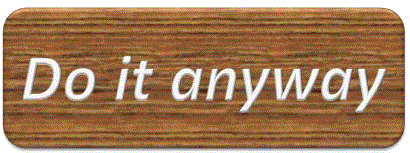 One of the students in my Emotional Intelligence class told our group about her childhood. She had tough experiences growing up, and continues to deal with challenging family issues. She talked about feeling overwhelmed at times.
One of the students in my Emotional Intelligence class told our group about her childhood. She had tough experiences growing up, and continues to deal with challenging family issues. She talked about feeling overwhelmed at times.
Her situation was unique, but I can relate to it. Don’t we all have something challenging in our pasts that we had to work to overcome? Don’t we all face situations from time to time that drag us down?
It’s what she told us next that stuck with me. She talked about volunteering with groups that help disadvantaged women and said she does it even when she feels sad. She contributes and gives support to others, even when she is grieving her own losses.
She felt sad and did it anyway.
A few days ago I read an article by Scott Dinsmore about fear. He talked about being paralyzed by doubt when he sat down to develop a new course. He talked about nearly cancelling a workshop that he had already advertised because when he tried to create the materials, he choked.
Then he wrote something really interesting. He said that when he completed those programs, he was proud of the way they turned out, and that he considers them the most significant work he’s ever done. Wow.
He was afraid and did it anyway.
This week I gave a short presentation to a local Rotary group, on the topic of preparing to quit a job. It was a great experience – the Rotarians were gracious and I enjoyed the chance to connect with them. Plus, it was fun to speak about what I’d learned from all those hours of research. But leading up to the event… I was tired!
I had some of the Scott Dinsmore-styled fear, and am still grieving the loss of my beloved cat. But what really threw me off balance were two weeks of personal mayhem. Unexpected events consumed much of the hours and energy that I planned to use on preparing for the talk. Instead, I was on edge and sleep deprived, but I chose to work through the fatigue to narrow my topic, review my slides with friends and rehearse.
I was tired and did it anyway.
It doesn’t mean that we should keep pushing ourselves nonstop. Now that my presentation is done, I’m resting more, drinking immune-system-building tea and scaling back on social events while I regain my energy.
I’m a big believer in giving ourselves breaks. I think we should overcome the pressure to operate like robots, and stop congratulating ourselves when we ignore the need to rest and recover. But there’s a difference between relentlessly pushing ourselves past healthy limits and taking on specific challenges that require extra effort. Sometimes a goal or activity is worth the exertion required to get past obstacles like sadness, fear and tiredness.
The next time I have a big opportunity in front of me, one that is worth going after, I’m going to acknowledge how I feel about it. I’m going to think of ways to maintain my health while I pursue my goal. And then I’m going to —
do it anyway.
Why it’s Smart to be Prepared to Leave Your Job on a Moment’s Notice
Whether you plan to quit your job now or never, it is smart to be ready to leave on a moment’s notice. It’s not about being fearful that you might lose your job. It’s about gaining confidence by being prepared.
Here’s why it’s important:
- Being ready to quit is like having a grab-and-go bag for your career. Tomorrow might be your last day at work whether you want it to be or not. Layoffs happen, businesses fail, companies relocate. Job security is more of a wish than a reality.
- You’ll be empowered. You’ll have options and will be less dependent on your employer to meet your financial needs and your personal career goals.
- You may be more successful at your job. Feeling that you can leave at any time, you might take smart risks that pay off. You might speak up more, and get more attention for your projects.
- You’ll be more agile. If you’re shoulder-tapped to transfer to a new role or new location, you can change gears quickly. Or you can say no and let the chips fall where they may, because you’re ready for it.
There are multiple components to being fully prepared that involve finances, health, shoring up support and more. If you don’t know where to start, take a look at your work tools. If you’re using a computer or cell phone provided by your employer, would you be ok if you were asked to hand them over tomorrow? If not, wipe all your personal photos, documents and data from your employer’s property. Stop using your company’s email address for personal communications. Make sure you have copies of your address book on your own computer and phone.
Another step is to make sure you’ve got copies of important information safely stored at home. This includes copies of your performance reviews and records of awards and achievements, so you can use that information to customize resumes in the future. It also includes having a portfolio of work samples that you can use in future interviews or as resources in your next role. Work samples could be snapshots of projects you worked on, non-confidential reports and presentations, or tangible materials that you produced. Make sure to take home financial documents like recent pay stubs and information about company-sponsored retirement plans and investments.
A third place to consider is your work space. Years ago my office was draped in personal belongings. I had two lamps, framed art on the walls, and a bookcase full of books, awards and photos. I even had hippie beads hanging from my door frame. (Don’t judge – people loved my office!) But when I left my office for the last time, I walked out with a single cardboard box of personal items. As I was working through my exit plan, I slowly swapped out the objects that were most important to me with fewer and more portable pieces. If you make this transition thoughtfully, nobody else will notice. But you’ll have the satisfaction of knowing you could hold your cardboard box in one hand while you use the other to wave ‘bye.
Hard Lessons
These are lessons I didn’t want to learn. If the tradeoff was having Milo with me or knowing what I know now? I’d pick my cat. Of course I would.
But life doesn’t work that way, so I figure that the only thing worse that losing him would be to not learn anything from it.
The first lesson came when my cat started showing symptoms that were later diagnosed as thyroid disease and lymphoma. I fell apart every day. Sometimes multiple times in a day. By falling apart I mean crying, and moments where my energy drained out of me and all I wanted to do was lay down.
Then I decided that I didn’t want to live like that anymore. With chemotherapy and his other medicines, it was possible that he would have lived for up to three more years and I didn’t want to be depressed that entire time. I made a choice not to make his illness the center of my life. I had a book to finish, relationships to care for and work to do. When he died, that choice became not making his death the center of my life.
The second lesson I learned is that I can control my thoughts. We hear a lot about this – the power of positive thinking, we create our own realities, blah blah. At different times in my life I have tried to consciously choose my thoughts but it wasn’t that effective. I also had some scorn about people trying to brainwash themselves into believing they were better off than they actually were. It seemed unauthentic.
Soon after Milo died, I felt a tremendous sense of guilt and regret. Not about euthanasia at the end. I regretted that I hadn’t rushed him to the ER sooner after he started going downhill the last time. He stopped eating and drinking and I waited, thinking about how stressful the hospital was and how much he hated it. I waited, wondering if would be better to let him die at home than put him through more intervention. I waited, asking myself how many times we were going to do this. Then the decision got past me, and by the time I took him to get fluids, it was a hospice mission.
After he was gone, I wished I could go back in time and make a different choice. I kept thinking, “if only I had taken him to the hospital sooner, would he still be alive?” These thoughts were so painful that I had to stop them. I realized that they didn’t serve me – they only caused me to suffer, and they didn’t honor Milo’s life. I made myself acknowledge that there is no way of knowing if he would have lived longer, and that thinking I made the wrong choices was just one story. Another story is that I did the right thing. Possibly more treatment would have been worse for him, or he might have died there, in the place he hated, away from me.
The “if only” thoughts still came, but when they did, I forcibly stopped them. As soon as I caught myself, I would think, “NO!” And then tell myself, “I choose to believe the possibility that I made the right choices.” At first this scenario played out repeatedly. After a while, less so.
The third lesson was that the support I received taught me how to support others in grief. One friend called me the evening that Milo passed away, and just listened. She invited me to go out the next night, and getting out and doing something helped. Another friend came to my house the next day with a plant, and the formalness of it made me feel like we were memorializing Milo. Receiving cards and reading messages from people on Facebook also helped.
In the past, I wasn’t always one to reach out when someone else experienced a loss. I might have been unsure if making contact was welcome. What if they wanted to be alone with their grief? Or I felt unsure of what to say and then didn’t reach out at all. After being comforted by other people’s gestures, I decided that even if I didn’t know what that person wanted, it is better to send an email, a text or make a phone call than not.
The last lesson I’ve learned is to look for support and comfort. Besides accepting help from my friends and family, I took action on my own. I read articles online about grieving animal companions, and found a weekly candle lighting ceremony at www.petloss.com. Each Monday, people across the globe gather online to read a prayer for our animals and light candles to honor them. When the ceremony isn’t taking place, people can use the chat room to seek support from each other.
A few days ago, a blog that I subscribe to included a post called Moving Beyond the Pain of Losing Someone You Love. The author, Karen Lang, wrote about the tragic loss of her son and how for a period of time she doubted the choices she made at the end of his life and was consumed with wondering “what if”. Although our losses are different, she expressed what I had been feeling and that was reassuring.
I also happened to get an email with a link to a podcast that featured Christina Rasmussen, who wrote a book called Second Firsts: Live, Laugh, and Love Again. Normally I have no patience for podcasts, but I listened to this one twice. She uses science to support her theories and talked about the importance of giving ourselves time to rest and recover when we’re hurt: she calls this “the waiting room”.
No matter what I have going on in my life, I feel self-imposed pressure to complete my self-imposed deadlines for work and writing. When I take breaks or try to get extra rest, I often wind up feeling more anxious instead of energized. Rasmussen’s message pointed out that allowing myself downtime is more helpful than slogging through my to-do list.
None of these lessons are worth what I lost. But they’re better than not learning anything at all.
Breakup Songs for Cats
I was listening to a This American Life podcast one August evening this summer. The topic was breakups.
It made me think about a particularly bad breakup that took place in August years ago. And then – ugh, I put it out of my mind because while I’m happy with my life and grateful for the way things turned out, at the time it was devastating. There’s no need to dredge up old pain.
After the podcast ended, I went to the kitchen to get a glass of water and check on Milo. I saw him lying under a chair, a pile of fur. He didn’t even look like a cat. Just a mess of puffed up, black cat hair. When I stepped back into the living room he was sitting up, watching me.
I whispered, “I’m coming to get you,” and starting walking towards him slowly with big, exaggerated steps and my arms up like Frankenstein. I paused, “I’m going to kiss your head,” then moved closer. When I was four feet away, I could hear him purr. I started crying, but kept going until I smooched his head anyway.
It made me think there’s something missing in the genre of songs about the loss of love. I haven’t heard any about the loss of a pet. The pain is deep and aching, and is something that so many of us go through. So why not?
One segment of the podcast was about a woman who was so immersed in breakup songs that she wrote and recorded one of her own to help deal with her loss. Much of the sentiment in songs about broken love touch into the same heartache over the thought of losing Milo. There’s disbelief and aching sadness. There’s a flood of memories. There’s a feeling that a very real piece of me is being cut away. The worst feeling is the one that hits me when I go about my day and suddenly remember that he’s sick, and that someday, even if he made it through this illness, he’s going to die. That remembering – it’s a sudden shock that pounces on me, over and over.
Life changes so quickly. One thing I could count on was that every time I walked through my front door, Milo would be home, waiting for me. When I was grieving the deaths of family members or the endings of relationships, he was a consistent source of comfort. Through the upheaval of quitting my job and the neurosis of writing a book and the ups and downs of starting a business, he has been there. For nearly twelve years, Milo has been there.
I told him, “Don’t leave me. I need you.”
He’d been sick since the end of June, vomiting and not eating much, and dropped from an already tiny ten pounds down to seven. In July, he had to stay the night at the hospital for the first time. It was after 11PM when I went home without him, walked into my house and noticed all the markers of his life there. His food bowl, scratching post, toys. Cat hair on the edge of my blanket.
I got up early the next day to drive to the hospital to check on him. He was much better. He was alert and busy checking out the exam room. He ate some food and tried to scratch the cabinets and the seat covers. I stopped him, but appreciated his willfulness. He kept a wary eye on the door.
Once home, he would get better and then he would get worse. He was diagnosed with lymphoma in the intestines. His twice daily medicines were adjusted. We grew to hate the many trips to the hospital, although I’m grateful for their care. The good days went by so quickly. The bad ones stretched out painfully.
A couple of weeks ago, he lay next to me on the couch, his back against my stomach. This is my favorite way to sit close together, but not his, so whenever he curled up next to me I held onto the moment as long as I could.
Some web sites say indoor cats average 12 – 18 years. My vet used to say he could live into his twenties and that is what I’ve expected. Twelve is not long enough.
The prognosis for his cancer is up to three years. My attitude changed. I’ll take three more years. Three more years is great. Please give me three more years.
I want a love song for my cat. And for all the brokenhearted women and men like me. Where’s our song about knowing he’s going to leave and not wanting to accept it? Where’s the song for after he’s gone, when all that’s left are the tufts of fur in the corners of the room?
Milo passed away on Friday with the help of our home vet. In his last few days he stopped making his adorable meow-els, but he gave me one last purr as we said goodbye.
It was a life well lived. A life well loved.

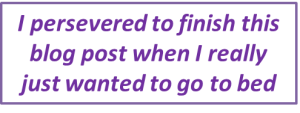


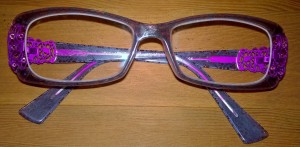
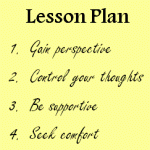
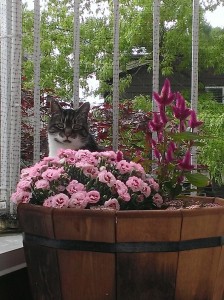



Recent Comments